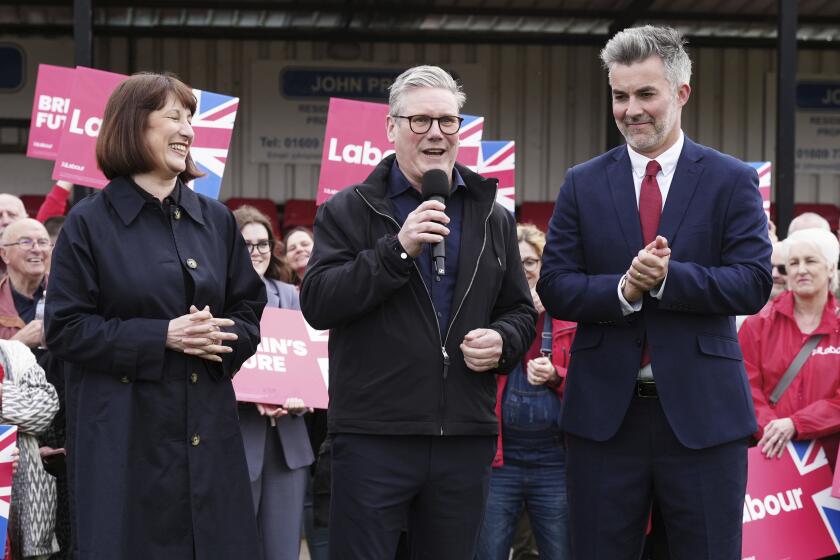NEWS ANALYSIS
For all the sweeping changes that President Obama has delivered, there also has been an ample helping of more-of-the-same.
The Bush policy of imprisoning enemy combatants in Afghanistan without trial? The Obama White House is OK with that.
The Bush tax cuts for the rich that candidate Obama promised to wipe out early? President Obama will let them run their course.
The Bush team’s claim of a “state secrets” privilege to avoid releasing information? The Obama White House has agreed thrice over, even as it reviews the policy.
Across the landscape of government, there are plenty of other instances in which Obama is staying his Republican predecessor’s course -- at least for now.
His holdover actions can be traced to a variety of factors: the practical realities of governing, the natural inclination of presidents to preserve their powers, the limits imposed by a tough economy and existing entanglements abroad, and the fact that it’s not always easy or desirable to turn around complex policies on a dime.
After all, he’s been in office not even six weeks.
In one case last week, Obama’s Justice Department seemed to be holding its nose as it tried to explain why it was continuing the Bush administration’s claim that telecommunications companies cannot be sued for cooperating with the government’s secret warrantless wiretapping program.
“The government is compelled to defend [the] statute as long as it can reasonably do so,” spokesman Matthew Miller said in a statement.
Some Obama supporters are nervous.
“There are some troubling signs that can’t be ignored,” Anthony Romero of the American Civil Liberties Union wrote recently about Obama administration actions on secrecy, torture and abuse.
Some Obama critics are chortling.
“Here’s something President Obama’s biggest fans may need to hear: He’s just not that into you,” conservative columnist Jonah Goldberg wrote last week. He pointed to the enemy combatant and state secrets cases, Obama’s decision to retain George W. Bush’s Defense secretary, Robert M. Gates, and continued support for faith-based programs.
Stephen Biddle, an expert on national security policy at the Council on Foreign Relations, said it’s healthy that Obama is avoiding the mindset that Bush adopted when he came to office with a reflexive ABC -- Anything But Clinton -- approach.
“What we’re getting isn’t an administration that’s automatically rejecting everything,” Biddle said. “He’s trying to make these calls one by one on the merits.”
Whatever his reasons, Obama has taken some supporters aback with a number of recent actions.
In one, the administration sided with Bush in trying to kill a lawsuit that seeks to recover what could be millions of missing White House e-mails from the Bush years.
Obama’s administration also echoed Bush in maintaining that detainees in Afghanistan have no constitutional rights.
In three pending court cases, it has invoked a “state secrets” argument or similar claims to avoid disclosure of sensitive information even as it conducts a wide-ranging review of what secrets should be kept. An appeals court ruled against the government in one of those cases Friday, refusing to stop a lawsuit brought by the U.S. chapter of an Islamic charity.
Glenn Sulmasy, who teaches constitutional law at the U.S. Coast Guard Academy, said Obama is simply shifting from campaigning to governing.
“It’s just the realities of executive power in the 21st century,” Sulmasy said. “When you sit down and see the threat of Al Qaeda and the threats to national security and homeland security, this would be natural and normal for him to take such steps and measures.”
Beyond national security, campaign-trail calls for an early end to the Bush tax cuts for the wealthiest Americans vanished when the economy went into free fall. Nor is Obama inclined to force a renegotiation of the North American Free Trade Agreement, as he hinted during the campaign that he might do.
Still, Obama won’t extend tax cuts for the rich, as Republicans want. He plans to let the lower rates on the wealthy go back up on schedule and further ding the rich by limiting their deductions starting in 2011.
Obama can point to any number of swift policy reversals. He signed legislation to provide health coverage to 11 million children that had been twice vetoed by Bush. He issued pro-union executive orders and signed a law to help workers suing over pay discrimination.
He is shifting more troops to Afghanistan and aiming to order all U.S. combat troops to leave Iraq by August of next year. His attorney general declared waterboarding to be torture, setting a sharply different tone from the past administration. Obama has promised to close the Guantanamo detention center within a year.
In some cases, Obama hasn’t acted fast enough or gone far enough for those eager for change.
Groups that had been critical of Bush’s support for religious organizations grumbled when Obama expanded and redefined the White House office that helps those charities. Barry Lynn, president of Americans United for Separation of Church and State, said he was shocked that Obama hadn’t reversed Bush executive orders that allow religious groups receiving federal money to discriminate in hiring.
“I’m deeply disappointed that he’s failed to clean up even the obvious constitutional and civil rights problems of the Bush administration,” Lynn said.
Proponents of stem cell research, meanwhile, had expected the new president to immediately reverse Bush’s executive order prohibiting federal financing for research involving new embryonic stem cell lines. They weren’t reassured when Obama advisor David Axelrod said recently that he expected “something on that soon, I think.”
On another issue, good-government groups cheered when Obama issued strict new ethics rules for appointees. But they question whether some appointees measure up to those standards.
Is the glass half-full or half-empty? “I’m all about the half-full,” said Danielle Brian, executive director of the Project on Government Oversight. But she added: “We’re calling the shots as we see them. He’s not going to get any passes from us.”
--
Devlin Barrett, Matt Apuzzo, Phil Elliott, Matt Daly, Dina Cappiello, Lauran Neergaard and Suzanne Gamboa contributed to this report.
More to Read
Start your day right
Sign up for Essential California for news, features and recommendations from the L.A. Times and beyond in your inbox six days a week.
You may occasionally receive promotional content from the Los Angeles Times.






